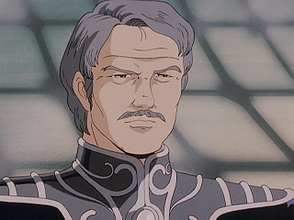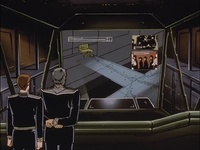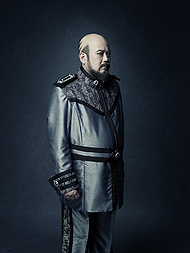Willibald Joachim von Merkatz
From Gineipaedia, the Legend of Galactic Heroes wiki
 High Admiral Merkatz (799 UC (1 NIC / 490 IC / 3599 CE)) | |
| Gender: | Male |
| Affiliation: | Iserlohn Republic El Facil Revolutionary Government (former) Free Planets Alliance/Imperial Legitimate Government (former) Galactic Empire (former) |
| Rank: | High Admiral Fleet Admiral (appointed by legitimate government) |
| Flagship(s): | Hyperion Nördlingen (former) |
| Occupation: | Legitimate government war minister (former) |
| Status: | Deceased (killed in action) |
| Born: | 738 UC (429 IC / 3538 CE) |
| Died: | 801 UC (3 NIC / 492 IC / 3601 CE) |
| Played by: | Naya Gorō (deceased) |
Willibald Joachim von Merkatz (Japanese: ウィリバルト・ヨアヒム・フォン・メルカッツ) was a distinguished Imperial high admiral who defected to the Alliance after being defeated in a civil war and went on to serve both Yang Wen-li as well as the Imperial exiled government. A veteran of countless battles, he was noted for his penchant of using massed small craft such as Imperial gunships or later Alliance Spartanians in direct strikes against enemy warships. Fleet Admiral Oskar von Reuenthal regarded him as one of the greatest tacticians of their era, the others being himself, Yang, Reinhard, and Wolfgang Mittermeyer.
Merkatz was killed in action during the Battle of Shiva in 801 UC (3 NIC / 492 IC / 3601 CE), aged 63. His faithful adjutant who had served him for at least about five years, Commander Bernhard von Schneider, performed his final duty to the admiral by returning Merkatz's remains to his family in the Empire.
Contents |
Late Goldenbaum Dynasty

Not much is known about Merkatz's early career besides the fact that he was a flag officer since at least 791 UC (482 IC / 3591 CE), and that he had become a famous soldier before Reinhard was born, according to Paul von Oberstein. He was also regarded as popular and respected among lower ranking Imperial ratings and junior officers, with his reputation as a military commander being even known in the Alliance. One of his known actions was as a full admiral during the Sixth Battle of Iserlohn in 794 UC (485 IC / 3594 CE), where he was the only elderly commander who fought in the fleet battle outside of Iserlohn Fortress and commanded the main Imperial fleet. (MUT: 'Chapter IV', HBSHBL: 'A Hundred Billion Stars, One Ambition', LOGH: 'Courage and Loyalty', 'Victory for Whose Sake?')
Admiral Merkatz was one of five fleet commanders assigned to Reinhard von Lohengramm to replace his loyal subordinates prior to the start of the operation that would become the Battle of Astarte. While the others were vice admirals and rear admirals, Merkatz was a full admiral. He and the other officers were considered to be "problematic" by the Imperial naval command and that was the main reason for their assignment to Reinhard in the place of his regular staff, as this operation was not expected to succeed. It was noted by Oskar von Reuenthal at the time that Merkatz was recognized as a skilled commander but lacked adaptability and that prevented him from being promoted to Fleet Admiral. However, during the battle Merkatz fought well against both the Alliance 4th Fleet and 6th Fleet. After Reinhard's operational plan turned out to be a success, much to everyone's surprise, Merkatz came to acknowledge the younger admiral's genius and his skepticism of Reinhard changed into respect. It was an attitude that stood in stark contrast to the continued contempt that the rest of the Imperial upper strata possessed toward Reinhard. (Overture to a New War, LOGH: 'In the Eternal Night', 'The Battle of Astarte')
The Lippstadt Rebellion

During the attempted Alliance invasion of the Empire in the late summer and fall of 796 UC (487 IC / 3596 CE), Merkatz was not involved as Count Lohengramm and his subordinates were given the task of defending Imperial territory. However, when Emperor Friedrich IV suddenly died shortly after the rout of the Alliance forces in October, a power struggle broke out within the Empire. The highborn aristocrats representing the Goldenbaum Dynasty's traditions and power were pitted against the ambitious reformist upstarts under Reinhard von Lohengramm, along with his ally of convenience, Minister of State Klaus von Lichtenlade. The Lohengramm–Lichtenlade axis placed the very young and impressionable Erwin Josef II on the throne, with the nobles seeing this as an assault against their influence. Although Merkatz initially wanted to remain neutral because he saw no reason to harm the troops with infighting, Duke Otto von Braunschweig threatened the old admiral into going along with the high nobles. (LOGH: 'When the Rain of Grief Comes...', 'New Trends', 'The Lippstadt Conspiracy')
Duke Braunschweig did naturally appoint High Admiral Merkatz the commander-in-chief of the Lippstadt Allied Forces upon the outbreak of the civil war, as the confederated aristocrats' combined military came to be known. Using Geiersburg Fortress as their base of operations, Merkatz proposed that they allow Reinhard's forces to come to them so the Lippstadt fleet could attack them when they stretched out their supply lines and were far from Odin. However, a proposal by Admiral Staden to attack Odin while Reinhard was away was also accepted much to Merkatz's chagrin, though Staden's force ended up being routed. Merkatz later scored the Lippstadt League's only victory over the enemy in the war, the Battle of Schann-tau, but it was strategically insignificant. He was also outraged to find upon his return that Marquis Wilhelm von Littenheim ventured out to fight against Admiral Siegfried Kircheis without consulting Merkatz, since Braunschweig allowed it to happen because he did not want his rival Littenheim around, ignoring Merkatz's authority as supreme commander. Littenheim ended up being defeated and killed while losing a third of their fleet in the process. (LOGH: 'Bloodshed in Space', 'Courage and Loyalty')
As a result, the Lohengramm Fleet ended up surrounding the nobles at Geiersburg. The final straw for Merkatz was when some young nobles ignored his orders and decided to go out to fight the enemy instead of waiting them out. Also, by then the high aristocrats' view of the ageing admiral had greatly changed, from one of respect and admiration for a brilliant tactician to one of hatred and contempt for what they perceived to be cowardice and indecisiveness, as Merkatz had predicted before joining up with them. The nobles fell for Lohengramm's trick to lure them out of the fortress and their fleet was nearly destroyed, only saved by the high admiral sortieing out and saving them from total annihilation. (LOGH: 'Courage and Loyalty')
In his outrage at the murder of his nephew Baron Scheidt, Braunschweig ordered a nuclear attack on the planet Westerland despite it being considered a taboo to use nuclear weapons during that age, ignoring the advice of others against it. This attack recorded and broadcast across the Empire, serving to demoralize the Lippstadt troops and to shatter any lingering sympathies for the nobles among the populace. The situation began to fall apart as mass desertions and suicides began occurring in Geiersburg. Braunschweig and the other nobles ordered a full final assault with what remained of their fleet, which Merkatz joined in, and after they were defeated the old admiral contemplated suicide as he both felt too proud to surrender to Reinhard and due to his oath of loyalty to the Goldenbaum Dynasty. Merkatz was persuaded by his subordinate, Bernhard von Schneider, to seek refuge with Yang Wen-li instead by defecting to the Free Planets Alliance in order to fight another day. (LOGH: 'The Fall of Goldenbaum')
In the name of the Kaiser

Upon arriving in the Alliance, Merkatz and his adjutant Schneider were welcomed by Yang and his associates, although at first he and his adjutant were treated with suspicion by the rest of his staff. He and Schneider still continued to wear their Imperial uniforms and the old admiral considered himself to be a loyalist of the Goldenbaum Dynasty. Merkatz was given the status of a "guest admiral" while he was part of the Iserlohn Garrison Fleet, roughly equivalent to an Alliance vice admiral. In this capacity he mainly served as a tactical advisor and occasionally took command of the fleet, with the first occasion being during the Eighth Battle of Iserlohn. At the time Admiral Yang had been called for an inquiry on Heinessen and the Imperial Fleet attacked then with the mobilized Geiersburg Fortress (much to Merkatz's surprise). The guest admiral used the Alliance fleet to entrap and give heavy losses to Admiral Neidhart Müller's fleet. The attack from the Geiersburg force was eventually repulsed and Admiral Yang returned to assist them. (LOGH: 'First Battle', 'War Without Weapons', 'Fortress vs Fortress', 'The Return')
Not long after the attempted Imperial attack during the spring of 798 UC (489 IC / 3598 CE), a scheme organized by the leaders of Fezzan saw the young child emperor Erwin Josef II kidnapped from Neue Sanssouci on Fezzan by a couple of former Lippstadt officers and smuggled into the Alliance. Fezzani head of state Adrian Rubinsky used this as a means of preventing the Empire and Alliance from coming to terms, and Reinhard went along with his plan for his own purposes. Once the young kaiser arrived on Heinessen, the creation of a "Galactic Empire Legitimate Government" was proclaimed, which consisted mainly of high aristocrats and Lippstadt veterans. Merkatz found this out while viewing the broadcast on Iserlohn along with the rest of the Yang Fleet, and was shocked when he was announced as the government's minister of military affairs. After some deliberation with Schneider and others, Admiral Merkatz decided to accept the Imperial government-in-exile's request and departed for Heinessen. When Merkatz called it the highest honor that someone facing Reinhard von Lohengramm could have, Schneider pointed out that there were no troops for him to command and the position was mostly an empty title. Although the old admiral said he was still loyal to Emperor Erwin Josef, Merkatz believed that the remaining nobles should not have gotten a child involved in war and politics. Merkatz got promoted as Fleet Admiral by the government-in-exile.(LOGH: 'Lost Things', 'Thunder', 'The Abduction of the Young Emperor', 'The Arrow Is Released', 'A Departure')

With the beginning of Operation Ragnarök, the Empire's invasion of the Alliance using the Fezzan Corridor, Merkatz left Heinessen and took part in the major actions that the Yang Fleet carried out after the main Free Planets Star Fleet was defeated at Rantemario. His involvement with the Imperial government-in-exile was largely unknown, although he attended cabinet meetings and ended up being one of its last members to not abandon its premier, Count Jochen von Remscheid, as the Imperial invasion began. It's "military" consisted of less than ten people in total and decided to join Merkatz with the Yang Fleet. After taking part in various engagements with Imperial admirals, Merkatz and the rest took part in the Battle of Vermilion against Reinhard von Lohengramm's main fleet in a decisive battle. They ended up being tactically victorious but were prevented from obtaining victory by an order from the Alliance government on Heinessen telling them to stand down and asking for a ceasefire with the Imperial Fleet. A part of the Imperial force had taken control of Heinessen during the battle and thus ended the war, as Yang decided to follow the government's order. Admiral Yang assumed that most of the Alliance Navy would be dismantled as part of any peace treaty, so he sent a small group to lead a resistance movement that could provide a potential force to resist the Empire in the future. Since Merkatz was wanted by the Empire he asked the old admiral to lead this group, to which he agreed. (LOGH: 'The Cold Spell Arrives', 'The Darkness Before Dawn', 'Battle After Battle', 'The Battle of Vermilion (Part One)', 'The Battle of Vermilion (Part Two)', 'Sudden Change')
"Sherwood"
As Yang predicted, the Alliance signed the unequal Treaty of Ba'alat in May 799 UC (1 NIC / 490 IC / 3599 CE) which essentially turned it into a client state of the New Galactic Empire of the newly ascended Kaiser Reinhard, and began dismantling many of its warships. The remaining Imperial legitimate government had been dissolved and its members taken into custody, though the young emperor disappeared. Merkatz and a small force of sixty ships, meanwhile, had arrived at the abandoned Dayan Khan supply base in an asteroid, where they began planning their next move. This force also included a small number of Alliance military personnel that were officially listed as killed in action. Yang the others referred to Merkatz's group as "Sherwood," intending for it to preserve a part of the Alliance Fleet in order to lead a resistance in the future. They understood that they needed to expand their fleet, however, and Yang passed along information to Merkatz that the Alliance would be dismantling several thousand warships. Merkatz's group managed to capture many of the decommissioned battleships and carriers, while many crewmen defected to join their resistance group. However, the incident added credibility to rumors that had been circulating in the months following the end of the Alliance–Imperial War, that the old Imperial admiral was still alive and now that he was the one responsible for having carried out the hijacking of ships. The Imperials placed Yang and his former subordinates under surveillance. (LOGH: 'Sudden Change', 'After the Ceremony, the Curtain Rises Again...', 'Visitors', 'The Magician Is Captured')
A series of events on Heinessen in the summer of 799 led to the arrest of Yang by the Alliance government and the death of Imperial high commissioner Helmut Lennenkampf, which forced Yang and his subordinates to escape from the planet. They then headed to Merkatz's base of operations. The former Imperial high admiral, meanwhile, tried to ascertain the location of the abdicated Emperor Erwin Josef II. By that point of time, Merkatz no longer wished for the restoration of the Goldenbaum Dynasty, but he still felt a responsibility towards the well-being of the abdicated emperor. There were no reports on his whereabouts since his disappearance from Heinessen at the end of the war against the Empire, but Merkatz stated that one of his final goals in life was to locate him. After Yang Wen-li and his subordinates arrived at Dayan Khan, Merkatz helped them plot their next move as Kaiser Reinhard used the death of the high commissioner to justify a complete annexation of the Alliance. (LOGH: 'The Magician Is Captured', 'Invitation to an Opera', 'Blood Running Down the Stairs: Cascade', 'Holiday's End', 'Ragnarök Again')
El Facil and Iserlohn

Finally, in December 799 UC (1 NIC / 490 IC / 3599 CE), Yang made up his mind to go to El Facil, which had proclaimed its independence from both the Alliance and the Empire. As the Alliance government prepared to fight the Empire, Yang's former colleagues sent ships, personnel and supplies to join him at El Facil. High Admiral Merkatz became the chief of staff of the new "El Facil Revolutionary Reserve Force," which consisted of the former Yang Fleet and various Alliance ships that had come to join them. Yang made up his mind to retake Iserlohn Fortress but since the El Facil government wanted him to remain on the planet, he sent Merkatz as the commander of the assault force in his place. (LOGH: 'Against All Flags', 'To El Facil', 'The Plan to Retake Iserlohn')
Merkatz led the El Facil force in retaking Iserlohn by tricking the Lutz Fleet to leave the fortress and then using a previously established code, left by Yang when he abandoned Iserlohn, to shut down its computers. Thus the fleet was able to enter the fortress while Admiral Cornelius Lutz's main force was away without the threat of them using the Thor Hammer. Their ground troops, led by the Rosen Ritter regiment, secured the interior of the fortress and fired upon the returning Lutz Fleet, forcing it to retreat. Thus Iserlohn Fortress became the main headquarters of their group. (LOGH: 'The Prodigal Sons Come Home')
It was not long before Kaiser Reinhard decided to go on the offensive and besieged Iserlohn, taking over El Facil. Merkatz helped in the preparations in the assault and took field command during the initial stages of the Battle of the Corridor, when the Fahrenheit Fleet and the Black Lancers were lured in and defeated by the El Facil Revolutionary Reserve Force. The old admiral remembered Fahrenheit back from his days in the Imperial Navy, having fought alongside him at the Battle of Astarte and during the Imperial Civil War, and spent some time mourning after hearing of his old colleague's death. The next part of the battle saw the Yang Fleet triumph over the numerically superior Imperial forces, although largely thanks to the fact that Kaiser Reinhard fell ill and decided to come to terms with the El Facil government (or more specifically, with Yang personally). However, Yang was assassinated on the way there by members of the Church of Terra. (LOGH: 'Eve of the Festival', 'Spring Storm', 'The Battle of the Corridor: The Invincible and the Undefeated', 'The Battle of the Corridor: Kaleidoscope', 'The Battle of the Corridor: End of the Campaign', 'The Magician Doesn't Come Back')
Although many personnel left Iserlohn Fortress after the catastrophic loss of Admiral Yang, Merkatz was among those that stayed on and continued to work with the new leader, Julian Mintz, Yang's adopted son. He advised the young commander on the intentions of Fleet Admiral Oskar von Reuenthal during his uprising against Kaiser Reinhard, believing that Reuenthal's rebellion might have had a chance of success if it was able to avoid a two-front war and waited for the Imperial Fleet's supply lines to become too long. (LOGH: 'Disappointing Victory', 'The Urvashi Incident', 'The Two Great Ones Strike at Each Other!')
Merkatz again took field command during the Battle of Shiva in 801 UC (3 NIC / 492 IC / 3601 CE). The fleet actions led by Merkatz allowed a boarding ship to latch onto the Imperial supreme flagship, carrying the Rosen Ritter unit and some others, who fought their way to see the Kaiser. Merkatz himself was killed when he was injured in an explosion when the Hyperion came under fire from the Eisenach Fleet. Possessing more military experience than both Reinhard and Yang, he died at the age of 63, and his adjutant Commander Schneider performed his last duty to his superior by returning Merkatz's remains to his family back in the Empire. (LOGH: 'Invitation to Rebellion', 'A Challenge to Arms', 'The Crimson Star Road', 'The Beautiful Maiden Wants Blood', 'The Golden Lion Flag Loses Its Lustre')
Legacy

Merkatz was the classic career soldier and possibly one of the final supporters of the Goldenbaum Dynasty even though he knew there was no realistic chance of its revival. He knew that the old nobility as represented by the Lippstadt League had been corrupt and incompetent, and that life for the people of the Empire had improved with Lohengramm's reforms. Nonetheless, he could not bring himself to serve under Duke Lohengramm partly out of pride and partly out of feeling this would violate his oath of loyalty to the Goldenbaum Dynasty. Although he subsequently fought against the Galactic Empire and then the New Galactic Empire, he remained essentially apolitical and focused purely on military matters.
Appendices
Appearances
- LOGH:
- 'In the Eternal Night' (first appearance)
- 'The Battle of Astarte'
- 'Empire's Afterglow'
- 'The Lippstadt Conspiracy'
- 'Bloodshed in Space'
- 'Courage and Loyalty'
- 'The Fall of Goldenbaum'
- 'Victory for Whose Sake?'
- 'First Battle'
- 'War Without Weapons'
- 'Fortress vs Fortress'
- 'The Return'
- 'Determination and Ambition'
- 'The Arrow Is Released'
- 'A Departure'
- 'The Cold Spell Arrives'
- 'The Darkness Before Dawn'
- 'Battle After Battle'
- 'The Battle of Vermilion (Part One)'
- 'The Battle of Vermilion (Part Two)'
- 'Sudden Change'
- 'After the Ceremony, the Curtain Rises Again...'
- 'The Magician Is Captured'
- 'Holiday's End'
- 'The Prodigal Sons Come Home'
- 'Eve of the Festival'
- 'To the Windy Corridor'
- 'Spring Storm'
- 'The Battle of the Corridor: The Invincible and the Undefeated'
- 'The Battle of the Corridor: Kaleidoscope'
- 'The Battle of the Corridor: End of the Campaign'
- 'Disappointing Victory'
- 'The Urvashi Incident'
- 'The Two Great Ones Strike at Each Other!'
- 'Running Start Towards the Future'
- 'Invitation to Rebellion'
- 'A Challenge to Arms'
- 'The Crimson Star Road'
- 'The Beautiful Maiden Wants Blood' (death)
- Overture to a New War
Memorable quotes
- "I have served the Goldenbaum Dynasty as a soldier for over forty years. If it is to be destroyed, then my final duty is to share in its fate. Even then, I am only a worthless old man."
- "Don't be so mad. Duke Braunschweig is an ill man. Mentally. It's an illness bred from the five hundred year tradition of privilege for the nobility."
- "My loyalty to His Majesty the Kaiser is no less than the Count's."
- "What's hard for me to understand is that the people who should be protecting the young Kaiser are conversely pushing His Majesty into a vortex of political struggles and war."
- "Privilege corrupts a man's soul. You instinctively justify yourself while blaming others."
Background information
Willibald is a rare and old German given name of Saxon origin which roughly means force equipped with bold decision. Merkatz is the name of two 18th century Prussian noble families. It is also a shorter form for the meerkatze, the long-tailed monkey, or guenon.
Apocrypha
Stage

Merkatz is played by James Onoda in the 2011 stage adaptation of LOGH.